Read Chapter One Parts One, Two and Three
Chapter Two Parts One, Two and Three
Chapter Three Part One and Two and Three
Chapter Four Part One and Two
Chapter Five Part One and Two
Chapter Six Part One

Continued from Part One:
2011 was a watershed for natural wine in the UK. This was the time when people in the trade seemed to want to decide which side of the natural wine argumentative fence they were on.
Natural Wine Controversies
In retrospect, it seems daft now that such artificial oppositions were constructed. Those who disliked the phenomenon of natural wine viewed (and caricatured) it as a movement composed of ideological and self-delusional fundamentalists, hipsters with no taste who were jumping on a bandwagon, and vignerons who were content to peddle vinegar as part of a massive con on the public.
As an idea, natural wine challenges orthodoxy. The “movement” if we must use that assimilative term, is able to yoke together, on the one hand, the forensic standards of one Jules Chauvet, and, on the other, a jazz-punk irreverent sensibility and a nose-thumbing attitude towards bureaucratic authority. Not for nothing are the ferments called wild! It is easy to understand why people are attracted to the bohemian mixture of seriousness-and-faux-seriousness. The growers possess passion and energy; they put their life into the wine and an occasional crazy two-fingers-to-you label on the bottle. Drinkers are given something to root for.
Natural wine became – unintentionally – akin to a new artistic movement, a pot of paint thrown in the face of those who believe in precious hierarchies. If the conventional hierarchy purports to be wine reason, then natural wine was a critique of wine reason. Or the espousal of topsyturvydom. Whites are amber/orange in colour? Oxidative winemaking is noble? Wines do not always fall apart if no sulphur dioxide in used? Ladies and gentlemen – we’re through the looking glass here.
The growers possess passion and energy; they put their life into the wine and an occasional crazy two-fingers-to-you label on the bottle. Drinkers are given something to root for.
When I studied English literature at school, we were inculcated to believe in the great English tradition, an inevitable noble lineage of writers whose works could be aesthetically linked down the generations. Such certainties! In the wine world greatness has always been aligned to various cru classification systems. The world turns and opinions change. At university I soon discovered textual analysis, structuralism, post-structuralism, Marxism and various other critical approaches, and my views on art and literature began to change. I began to question what was considered right or reasonable and to interrogate the very structures of literature and art criticism.
“If you can’t count on history what can you count on?”
–Fleishmann, Northern Exposure
Tempting as it is to define natural wine as a movement it does not serve our argument for it is made of individuals who have their own ideas and free will. Much as we may conveniently label them as impressionists, fauvists, modernists, constructivists etc, for example, no two artists from a movement paint in exactly the same way. You wouldn’t confuse a Dufy with a Matisse, or a Kandinsky with a Klee. Marko Rothko would have hated to be thought of as part of a movement. The romantic poets, for example, were a completely amorphous bunch; even those who were the closest buddies and co-authored aesthetic manifestoes such as Wordsworth and Coleridge, wrote very differently. What binds people in artistic endeavour are common aspirations and energies, the intrinsic desire for change or the need to push personal boundaries.
The Fair
A headline in the Daily Telegraph on the eve of The Natural Wine Fair read “Beware of natural wines at The Natural Wine Fair”. What else would there be at a natural wine fair, you might ask, but, aside from that, this kind of pre-emptive judgement served to undermine the authority of those who purported to be writing about the subject in a considerate manner. At no other fair might you expect a journalist to warn: “Watch out, there might be some bad wines here!” It’s akin to reviewing a play before you’ve seen it. Besides, even if you entertained a soupçon of suspicion about the quality of wines on show at an event, you should never tar all the wines and all the growers with the same brush. The point about an artisan tasting is that it is not generic.
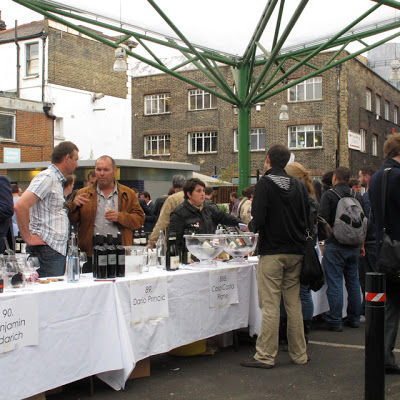
The three days of the fair passed in a blur. I remember standing in for the lovely Michèle Aubery of Domaine Gramenon, whilst she sloped off to the National Gallery (Michèle herself is a very talented painter), ostensibly for an hour, in reality for most of one of the days. When you taste her wines, you appreciate that she is an artisan/artist and these are natural canvases. It’s worth quoting her thoughts on painting, which bleed into natural winemaking – and vice versa.
Don’t say I am a self-taught painter.
Since I was young, I have been taught to appreciate beautiful works of art and gorgeous monuments. One of my best memories as a young child is that while sitting on my mother’s knees, she would open and show me an art book to allow me discover marvellous works.
It is true I have been keen on arts for a long time. Painting has always been part of my life.
My first art exhibition took place when I was 8, with the girls of my art workshop, in the shop window at the local paint seller’s store.
It is true that I am an amateur painter and I probably keep to myself.
My real passion is both to observe as much as I can, then to let myself carried away by what comes from the subject and the energy it gives out.
The feeling to get into material.
My motivation is to get into a feeling, an emotion, a sensation.
Wipe out ego and power and let come to me shapes and colors to often tell and tell again.
Then, as wine tasting could offer, emotion and sharing are sometimes possible… Sometimes.
–Michèle Aubéry
I recall clutching onto some wine glasses when a gust of wind threatened to pluck them from a table. Watching the queues build up each day. Tasting a 1991 Bourgogne Rouge from Julien Guillot. And cutting the atmosphere with a special atmosphere-cutting knife that I used to have about my person.
We see now more than ever if you do not challenge misconceptions in every walk of life, you devalue truth.
It was not all sweetness and natural light. During one of the masterclasses, the uncut atmosphere became increasingly tetchy when a certain MW damned the majority of wines being shown at the fair. Out there – she waved airily in the direction of Borough Market – I tasted so many oxidised, out-of-condition wines. Her tone was shot through with puzzlement as if she couldn’t conceive that hundreds of other tasters were literally lapping up the same wines. The naivety of youth who couldn’t smell the pig-in-the-poke even when their noses were rammed in the glass! In those days I didn’t suck up criticism easily, and so gave a tart rejoinder. I’ve never felt that disliking some wines was a reason to argue. One person’s taste is their own affair, after all. To disrespect the growers, the taste of other people, and not to provide evidence for an assumption, struck me as intellectually dishonest, however.
We see now more than ever if you do not challenge misconceptions in every walk of life, you devalue truth. That truth may be relative, but at least a light can be shined upon it and rational discourse entertained.
I dislike arguments of any kind. They are always vulgar, and often convincing.
–Oscar Wilde
For all that a master-class is meant to make people think and to challenge cherished beliefs, the fair itself was intended – through the charisma of the vignerons and the wines themselves – to discover areas of accord. The sheer diversity of styles (albeit all within the low-intervention idiom) in the tasting demonstrated that there is (or should be) something for everyone in natural wine. If the wilder extremes of zero-sulphur wine were not your bag of funk, then there were beautifully eloquent and pure examples of fruit-and-terroir-expression to enjoy. I have said before that wine is liquid pride (the pride of the land and of the vine, the pride of the grower, the pride of the winemaker) and this should always come before the prejudice of the taster. Every wine, particularly natural wine, needs to be tasted and evaluated on the basis of what it is, not what we think it should be.
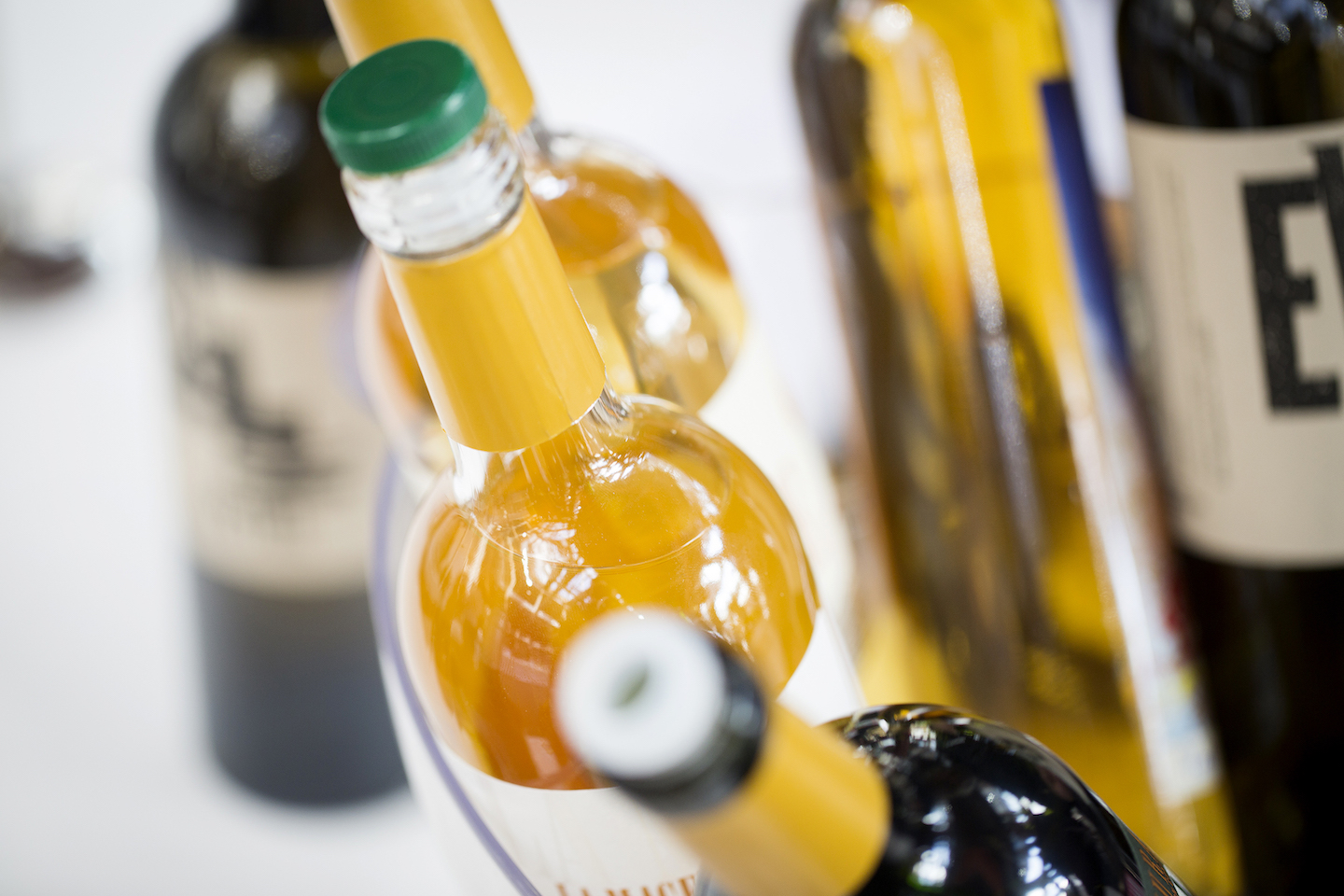
Digression: From Loathing to Love – Seven Types of Unambiguous Reaction to Natural Wines
There are various classes of people who emerge from the wormy woodwork when the subject of natural wine is broached to venture their tuppence ha’penorth. Sometimes the debate is generous, healthy and provocative in the best sense, sometimes it is just a bunch of egos basting themselves with their own self-perceived cleverness. Those wranglers can be divided into the following categories:
Les Bigotes– the arrogance of those who take undue offence at something that threatens their cosy view of the world and whose faces and voices are frozen in perpetual contumely. This is called the principle of contempt prior to investigation. They write things like “the public is being hoodwinked” and use overwrought terms like “fascism” willy-nilly as if natural wine were a political movement practising mind-control on unsuspecting old Bordeaux drinkers.
The Manichean Street Preachers – who propose a duality of epicurean truth and believe that supporters of natural wine are profoundly in the darkness.
The Devil’s Advocates – who like to construct theories or build reputations for the hell of it and then knock them down creating zeroes to heroes then sending them back to zeroes. This doublethink allows them to switch horses in mid-stream and never take a position that they have to defend in earnest.
Quaggling quaddler – an inveterate grumbling critic who literally quivers with asperity when the words “natural” and “wine” are juxtaposed in a single sentence.
The Pseudo-scientists – who will use science as an alibi for making dangerously unscientific assertions. They believe that because something has not been proved, it must, ipso facto, be false. Pseudo-scientists create “straw man” arguments, misrepresenting the viewpoints or intentions of those they disagree with, thinking that a one-sided argument is per se a rational argument and, so doing, are inevitably hoist on their own petar’.
The Scientists – who reduce everything to a test-tube, a petri dish and a justifying absolutism.
The Recanters – former advocates of one position they repenteth profoundly and become archbishops of the opposite point of view. In natural wine debate we have seen how some row back from the extreme edge, but also how conventional winemakers can move in the other direction.
Gentle Snidies – who write a seemingly balanced article on a subject but leave you with no doubt (reading between the lines) that they harbour negative feelings towards natural wines.
The Wibbly-Wobblies – these are exanimate people whose opinions change according to whim and the breeze of critical opinion.
The Supporters – drink and enjoy natural wine, go the festivals and caves –a –vins, but are not blind to faulty wines. Most of the people on the other side of the debate still think they are mildly/very (delete as appropriate) unhinged.
The Smell-no-evils – a rare breed who, when they are tasting, implicitly believe that all is for the best in the best possible worlds, and that no-sulphur wines are always the best in any circumstance. Even when the mouse is undoubtedly in the house.
As George Bernard Shaw said, “The moment we want to believe something, we suddenly see all the arguments for it, and become blind to the arguments against it.”
Here Socrates again interposed. “Well, gentlemen,” said he, “so far as drinking is concerned, you have my hearty approval; for wine does of a truth ‘moisten the soul’ and lull our griefs to sleep just as the mandragora does with men, at the same time awakening kindly feelings as oil quickens a flame”.
–Symposium 2 by Xenophon
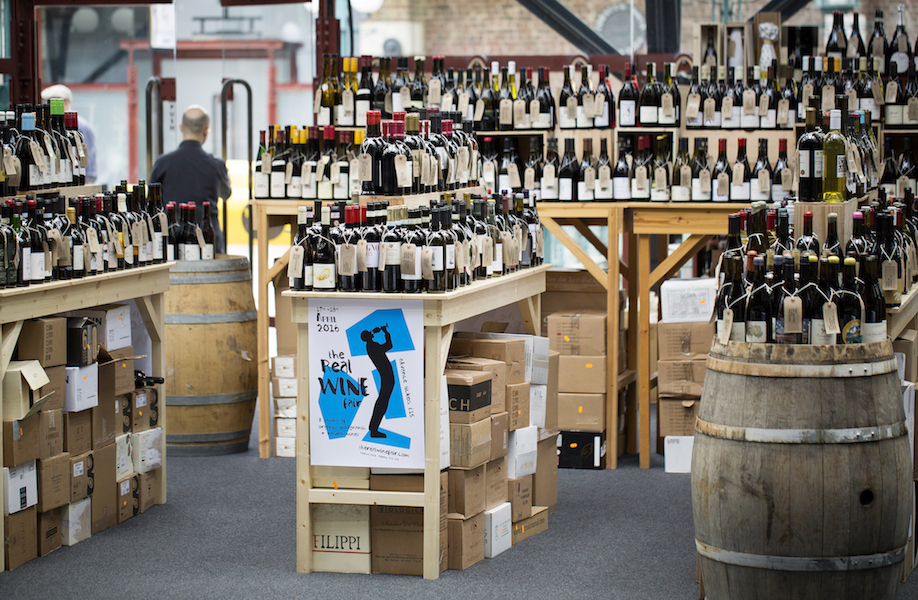
The Next Chapter
Despite the perceived success of the event and the positive feedback from growers and fair-goers alike, there was to be a schism in our small group, the eventual result of which was that two new events – The Real Wine Fair (a predominantly importer natural fair) and RAW (an event independent of importer involvement) were born. Both fairs underwent their maiden voyage in 2012, with Real Wine eventually being held two out of three years, whereas RAW was to become an annual fixture and has since given birth to several successful international versions of itself.
Our first independent foray was interesting – in a surreal way. In 2012, Real Wine was sequestered in the brutalist Victoria House in Holborn, a venue that screamed concrete bunker and tumbleweed at the same time. Its lack of natural light sent many of our French vignerons (and ourselves) spiralling into a deep depression. The line-up was huge – some 180 growers – and we packed the little rooms with masterclasses and seminars. We had fifteen hours of Mondovino playing in one particular cubbyhole with director, Jonathan Nossiter popping in to change the discs and address the empty room. Alice Feiring, meanwhile, presented two masterclasses, and Monty Waldin did something completely different entitled “Monty Waldin and The Meaning of Biodynamic Life.” Max Allen brought his banjo to his particular seminar called “The Real Wine Songlines – A New Direction for Australia.”
The Real Wine Fair consistently hosts around 170 growers from twenty countries, showing around 750 wines.
The fair ended with a dinner prepared by Ed Wilson and a cohort of restaurant mercenaries for three hundred people. Wanting some sort of musical entertainment, I had hired a strange-looking French busker who wandered the streets of central London and looked like a smaller version of Baron Samedi from Live and Let Die. I’m not sure what I expected, perhaps a new form of Voodoo-Brechtian cabaret; instead we were treated to a succession of cliché cover songs – with added distortion.
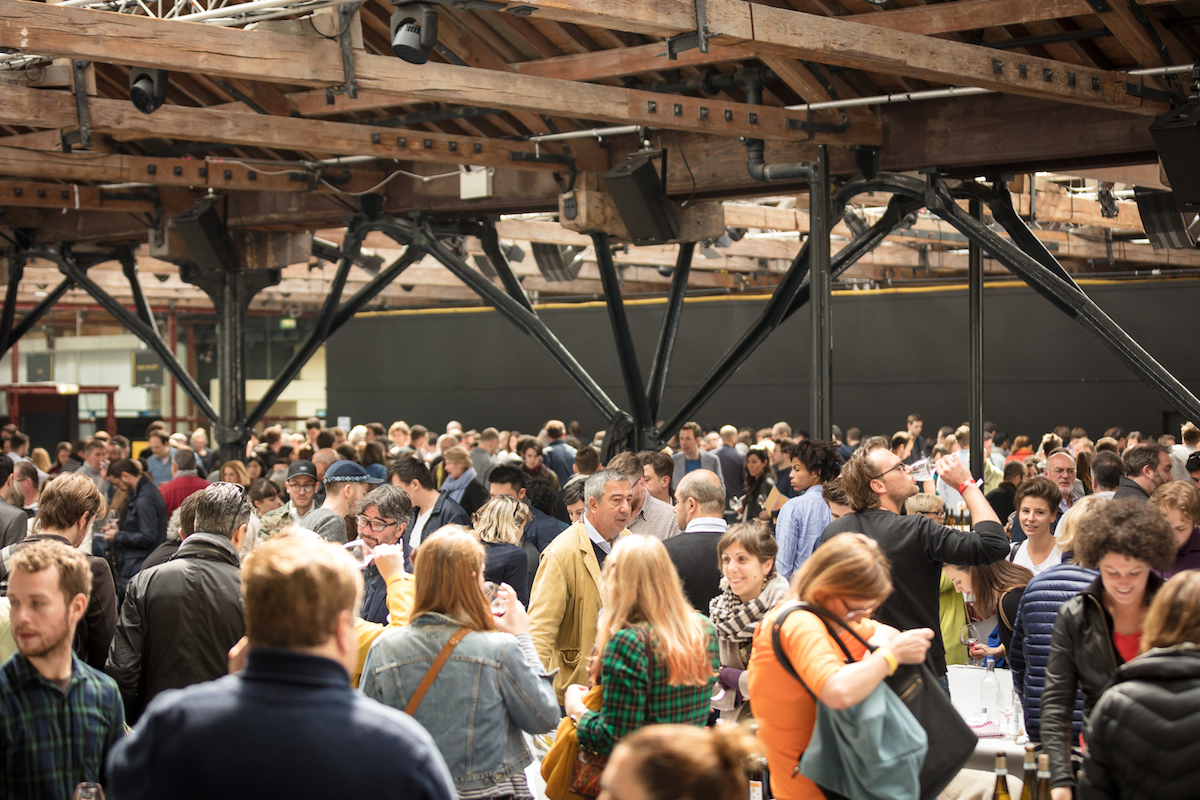
The Real Wine Fair relocated subsequently to Tobacco Dock in 2013, raising its profile to another level, and has been held there on four occasions thus far. The space, a former Victorian tobacco warehouse with long concourses, high beams, natural light, big airy halls and small side rooms, is fantastic, arguably the most suitable in London for such a fluid and wide-ranging tasting festival. For a couple of years (before a leaky roof closed it down) it even had a dedicated pub/restaurant, in which we could install our pop-up resto – manned by Ed Wilson and his team – felicitously-called “The Unfiltered Dog”. It was here, over dinner, that I overheard a group of French and Italian vignerons scoffing at the blandness of English food as they surveyed Ed’s homage-to-the-East-End menu. As they ladled on innocuous English mustard and horseradish sauce to accompany the salt beef, my sense of anticipatory glee increased. Steam issued from every vigneron orifice. To put it politely.
The Real Wine Fair consistently hosts around 170 growers from twenty countries, showing around 750 wines. The intro to the catalogue reads:
The Real Wine Fair is an independent festival of natural growers and winemakers, comprising those who work organically and/or biodynamically and with few or zero interventions in the winery. That said, real wine is relative rather than an absolute or precise term and embodies a certain spirit of endeavour in the vineyard and the winery. We understand that each grower has a highly specific approach; we should celebrate those differences.
Real wines tend to be made in small quantities by artisan or independent producers who work without chemicals (which means no fertilisers, pesticides or herbicides) in low yielding vineyards and then vinify without artificial yeasts or enzymes, or recourse to acidification or other adjustments. Many are made with only tiny amounts of added sulphur and some with none at all. ‘Nowt taken out and nowt put in’, as the saying goes. The motivation is to rediscover the true flavour of wine by capturing the sense of place (terroir) and the very nature of the vintage.
These wines are individual, hand-crafted, thrilling and unpredictable. They remind us that wine can be a living thing rather than a denatured product and that less intervention means more real flavour.
Each year we endeavour to find new angles without changing a winning format, and also try to refresh and improve the experience of tasting for both the visitor and the grower alike.
Despite its changing nature, Real Wine fixtures include the annual eve-of-fair growers’ parties and the Georgian supras (banquets) with their endless array of dishes washed down by amber wine, heartfelt toasts and polyphonic singing.
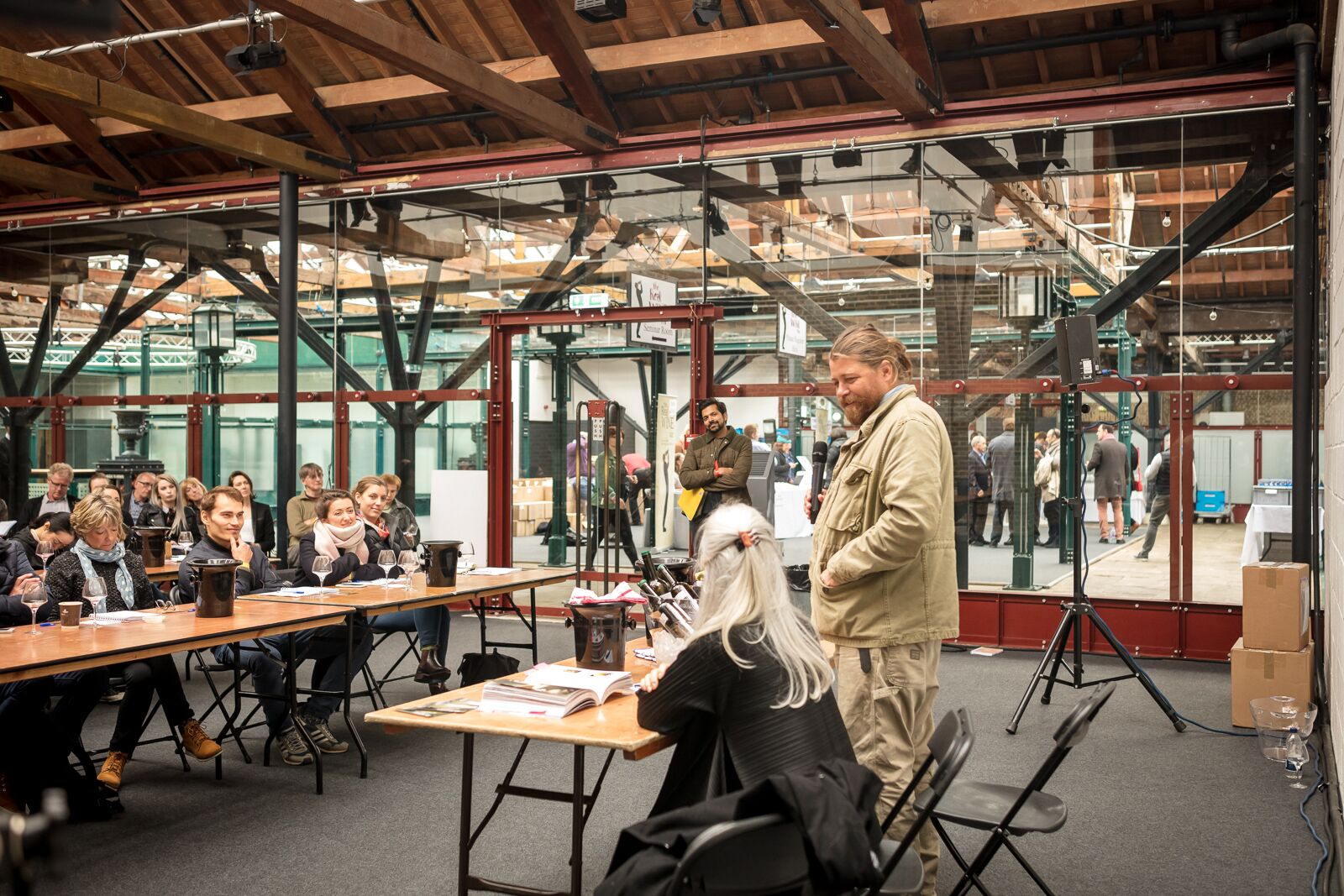
Over the years we have had a host of charismatic speakers for our Real Wine Masterclasses. In addition to Alice Feiring, Jonathan Nossiter and Max Allen, past speaks include: John Wurdeman, Jamie Goode, Pierre Frick, Wink Lorch, Carla Capalbo, Chad Stock, Michel Tolmer, Giusto Occhipinti, Salvo Foti, Mike Weersing and Tom Lubbe, talking about a variety of subjects ranging from biodynamics, wine flaw/faults, orange wine, Georgian gastronomy, the use of terracotta vessels in winemaking, and the New American Wine Scene.
Without wishing to sound sanctimonious, one of the principles of the Real Wine Fair was for Les Caves de P to put something back into the trade, to contribute to the greater good. It was never intended to be profit-making, or even financially self-sustaining. By doing everything in-house from the communication with the growers to the pr, to the setting-up and breaking down of the venue (Les Caves de Spittoons), we reduced costs and put our personal stamp on the event, thereby creating the friendliest tasting, one where you would not only encounter growers and try wines that were interesting and tasty, but would have the opportunity to buy wines you tasted, eat delicious food from a variety of restaurants, and attend seminars and masterclasses to learn from the experts.
We have kept the name of Les Caves de Pyrène at a semi-remove from The Real Wine Fair. We have a separate address for pr, a web site and social media accounts. It is not our trade tasting, it is a celebration of growers and wines. It is a celebration of natural wines. It is also an international event attracting wine aficionados and buyers from all over Europe, to Japan, Brazil, Canada, US and Australia. We have collaborated with many other smaller companies including, amongst others, Carte Blanche Wines, Newcomer Wines, Portuguese Story, Modal Wines, Roland Wines and Indigo Wines. Although we don’t articulate our credo in a manifesto with total allowable milligrams of SO2, we do want to talk about the spirit of natural wine and why we believe that it is important that people think about their wine choices.
Revisiting Taste, Tasters and Tastings
I have forgotten to tell you, Reader, that Jacques never went anywhere without a gourd filled with the best wine, which used to hang from the pommel of his saddle. Every time his master interrupted him with a question that was a little long he would unfasten his gourd, throw back his head, raise the gourd above it and pour a stream of its contents into his mouth, only putting it back when his master had stopped speaking. I have also forgotten to tell you that in moments which required reflection his first impulse was to ask his gourd. Were it a matter of resolving a moral question., discussing an event, choosing one road rather than another, beginning, continuing or abandoning a transaction, weighing up the advantages or disadvantages of a political matter, a commercial or financial speculation, the wisdom or folly of a law… his first word was, “Let us consult the gourd”, and his last word, “That is the opinion of the gourd and my own”.
–Jacques, The Fatalist, Diderot (presumably the origin of the expression “Gourd help me”?)
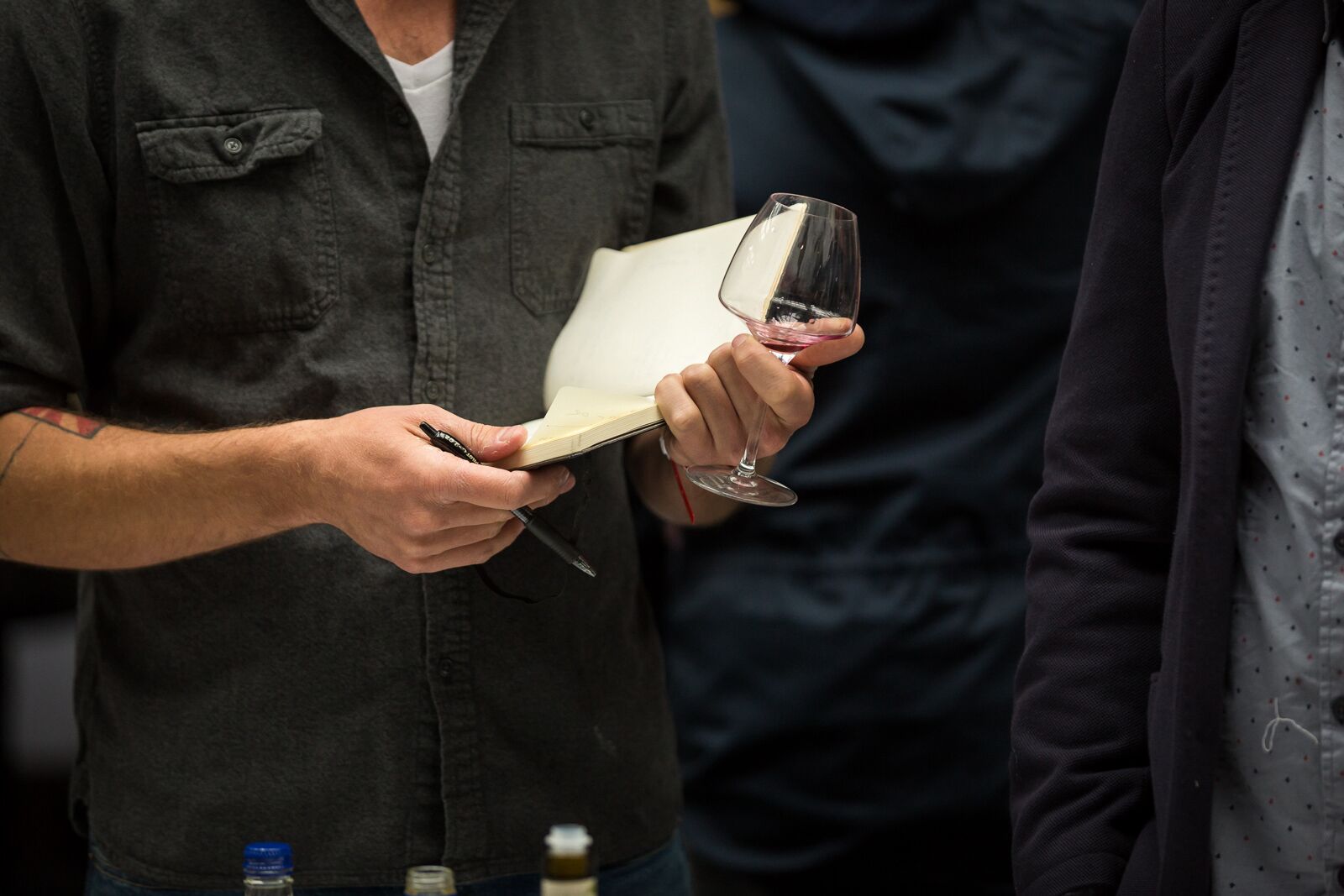
Zen and the art of attending wine fairs
- I see you’ve brought your own spittoon!
- Always prepare – that’s my motto. I’ve been up all night studying the tasting catalogue to optimise my tasting route. I’m now going to find a quiet corner, study some more, and mark out the growers I want to taste.
Starts annotating page after page.
15 minutes later. Mumbling to himself.
- Right, focus now. First, need to get a coffee and then follow my planned path. I’ve allotted just the right amount of time.
Stands in a queue for the coffee machine that stretches around the venue and hardly moves.
30 minutes later (finally) at the front of the queue
- I would like a double decaff latte with almond milk. It’s all right- I have my own re-usable cup.
Produces his own takeaway coffee cup.
- So sorry… we’re fresh out of decaf – just need to grind some more beans
Eventually receives coffee. Drinks it very slowly whilst studying the catalogue with rapt contemplation. His companion spots him in raptured contemplation.
- How’re you getting on?
- Getting there. Just need to go to the loo first and I’ll be at it.
Goes to the loo. There is an inordinately long queue. Waits patiently, reading the catalogue intently.
15 minutes later, comes out, looks around him. Walks slowly and deliberately to table of iconic producer and smirks knowingly.
- I would like to try your Vin Jaune Cuvee Gourmand 1995, s’il vous plait.
- So sorry… we have none left!
- Waaahhhh!!!!
To be continued in Part Three…

